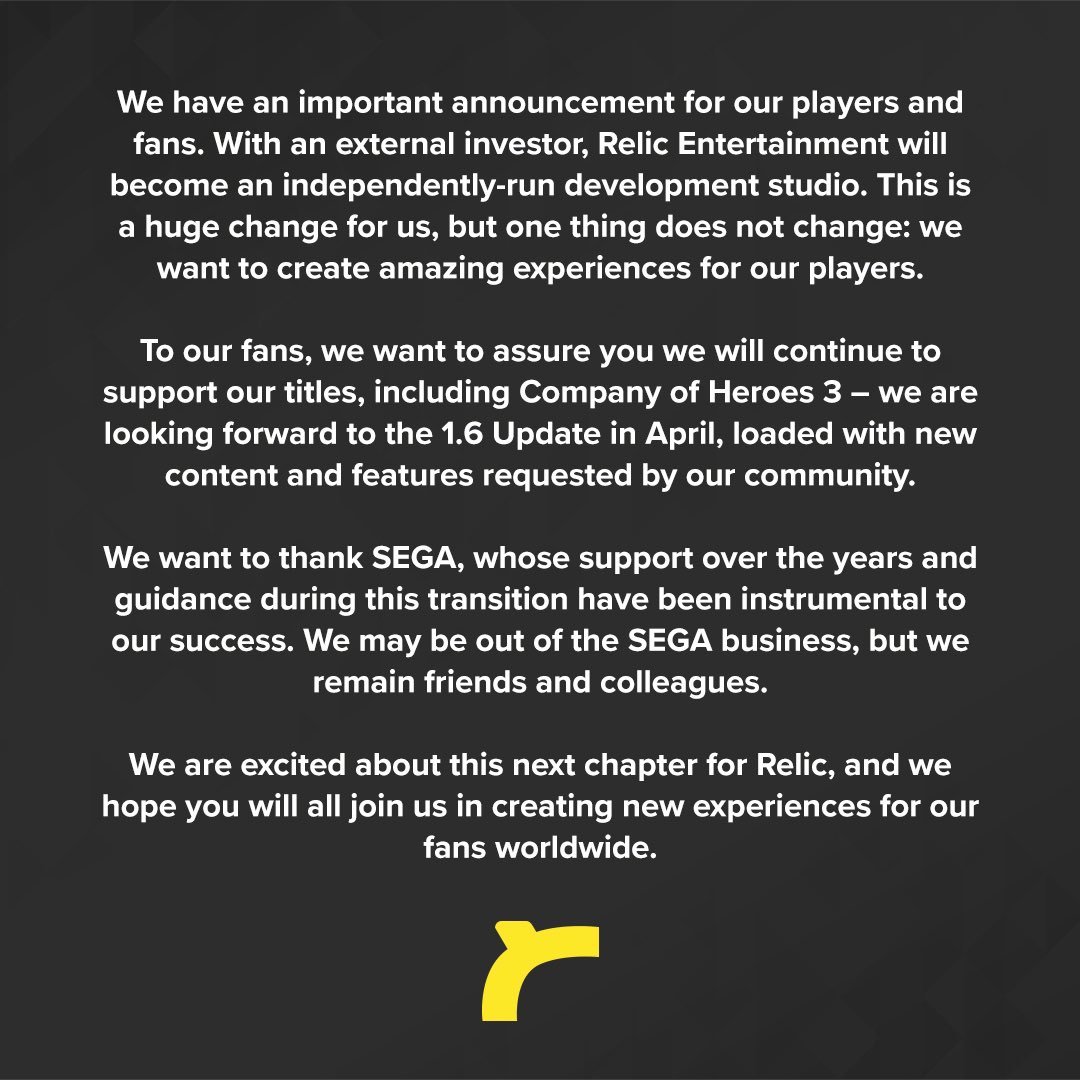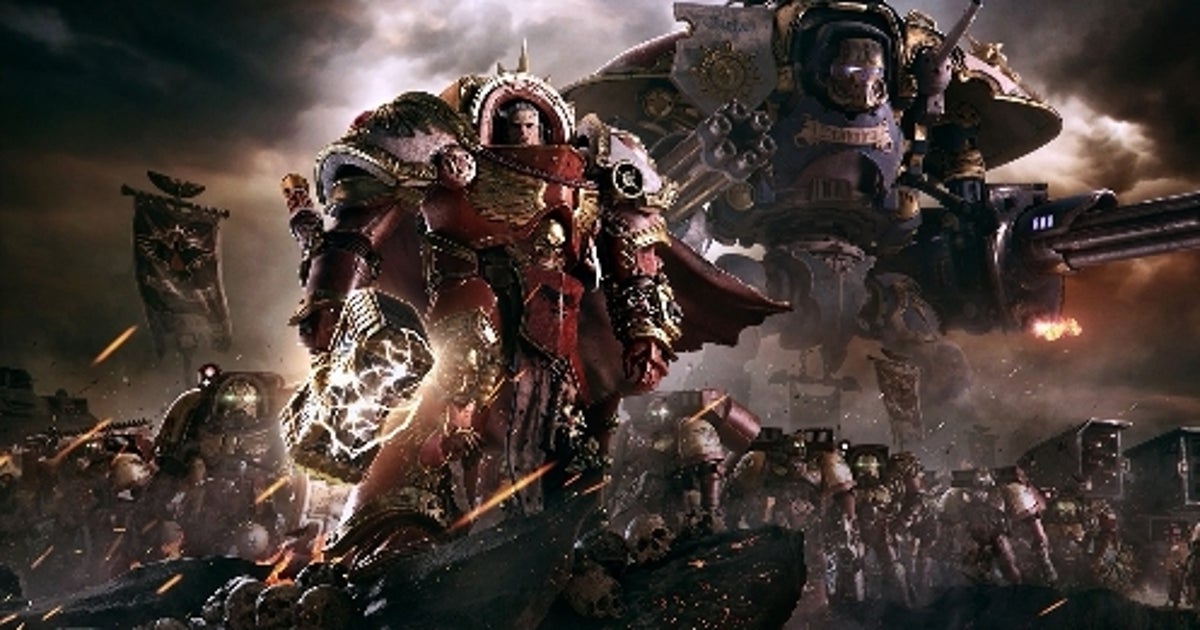
Sega Are Gutting Creative Assembly
The end of the financial year brings chaos as Sega balance their books by slashing western studios like Creative Assembly - at the expense of 240 of their staff and future projects.
Sega are gutting Creative Assembly and other Western Studios with 240 layoffs- as after a quarter where releases like Sonic Superstars, Endless Dungeon and Total War Pharoah failed to set the profit sheet ablaze, Sega are cutting costs.
Creative Assembly are bearing the brunt of it it seems, with the implications that staff and projects alike are being abandoned.
But if we want to see Sega’s plans in action, we only have to look at Relic Entertainment - a seemingly profitable company being sold by Sega in order to reduce their overheads. The end of the financial year brings chaos as Sega balance their books - at the expense of their staff and future projects.
Sega Continue Gutting Western Developers
- Sega, fresh off tacitly admitting they released Sonic Superstars too close to Super Mario Wonder to succeed - have decided to carve up their western operations again.
- We’ve got 240 layoffs, we’ve got a whole studio being sold - and we’ve got questions about what all of this means for the future.
- First up - those layoffs.
- This was confirmed via a Shareholders update from their Japanese arm, on Thursday morning.
- Which, as a reminder, was one day before the last working day of the financial year.
- This is balance sheet management ahead of year end reporting.
- And the cost of that?
We decided to reduce headcount by approximately 240 roles at several bases in the European region with the aim of optimizing fixed expenses.
- Those affected are mainly within Creative Assembly and the corporate entity Sega Europe, with a smaller contingent from Sonic Dream Team developer SEGA Hardlight also being let go.
- Sega reiterated that this is separate from the 230 layoffs conducted in September 2023 that we understand to broadly relate to the cancellation of Hyenas and mass layoffs of staff.
- Making this the second sweeping wave of layoffs to strike Creative Assembly in a single financial year.
- Unfortunately, as spotted in an email to staff viewed by Eurogamer, SEGA Europe head Jurgen Post was legally unable to inform staff of these cuts in advance, leading to many discovering they’d been laid off via reporting on the above Japanese update
"Due to the nature of this announcement and our legal obligations in Japan, we were unable to share any detail with you until now," Post wrote. "That is far from ideal and means some of you may have read about this in the media or via social networks before seeing this email. If that is the case, I'm sorry.
- With the way time zones work, this would likely mean some staff will have been finding this out before they got out of bed.
- In addition to this though, Sega announced a further review of in production titles - again, separate to the one conducted in 2023.
As a result of a review of the medium-term lineup in the European studios, we decided to implement write-downs of work-in-progress of some titles in development. As a result, we expect to record loss of approximately 5.6 billion yen as cost of sales.
- With the majority of these layoffs affecting Creative Assembly, it’s not guaranteed these project closures were at this company.
- But considering that the company would need staff to work on their games - that feels like a logical conclusion to draw.
- And so it’s where we’re going to put the majority of our focus.
- Because it feels like Creative Assembly in particular are trying to climb out of a hole while Sega pulls up the ladder.
The State of Creative Assembly
- Based on leaked documents provided to sources like Volound and information passed to folks like Legend of Total War, we can begin to get an idea of where the studio has been over the last few months.
- The corporate restructuring started in Autumn 2023 will have made “easy” cuts with regards to the team working on Hyenas, but clearly that wasn’t the end of it.
- This new list of layoffs will now be part of a wider review of the Creative Assembly structure, staff and development pipelines (those medium term projects in particular).
- Does this mean management (especially those who you believe are leading the company astray) have been fired?
- Not explicitly.
- In the previous reporting around the layoffs, one of the undercurrents was the idea that senior leadership were promoted or moved to retain their “talent”.
- As of right now, other than some PR and Marketing folks from Sega Europe who have announced they’re seeking new work, we don’t fully know the impact of these cuts.
- Speculating that individuals have been fired or removed with no evidence they’ve actually left the company rather than a role isn’t going to be helpful.
- And while folks like Legend of Total War are passing on from their sources that Creative Assembly staff are working on a Warhammer 40k game and a World Spanning Napoleonic game planned for release in the next year or two - as of right now it’s unclear if those leaks reflect the situation before or after the restructuring.
- Especially when, if those games have been in development prior to the problems of the last year, they’re likely far enough along that any meaningful changes will have to fight the inertia of their starting positions.
- They could still be coming, because we know that CA put out games near yearly, and they likely had some projects much closer to release than others.
- Meaning Sega will be questioning how much they’re willing to throw away or invest further.
- Remember, one of the flashpoints that caused Creative Assembly’s current problems was the fact they needed higher returns from their DLC to justify the costs of making them.
- They then didn’t execute that process well - but the motivation hasn’t changed.
- As a company they needed to show higher returns, which would increase income versus expenditure, which would justify their work to their publicly owned overlords in Sega.
- And that problem is nicely encapsulated in the second part of their announcement - the release of Relic Entertainment.
Relic of an Independent Era
- Relic Entertainment are being spun back off from SEGA.
- Marking their return to independence after being bought by THQ in 2004, before SEGA acquired them amidst THQ’s bankruptcy in 2013.
- Sega already had laid off 121 employees from the company in May 2023.
- That followed a launch for Company of Heroes 3 that reviewed well, but lacked polish and angered long time series fans for not being in a state they deemed complete - especially as the game was also being built for console SKUs as well as PC.
- Now though, with the aid of an (unnamed) external investor, Relic Entertainment are being released back into their own management.

- But why release them from Sega?
- And why now - after already conducting layoffs and presumably with games in the pipeline.
- Simple answer - based on the data, they weren’t profitable enough or creating games fast enough.
- As shown by Sega’s own reports to their investors in the sale of the asset:

- In October 2021, Relic released Age of Empires IV.
- In February 2023, Relic released Company of Heroes 3.
- Compare those dates with the charts above (and remember AoE4 was made on Spec for Microsoft)
- Sales were increasing, with a very clear sign that Relic is a company that lives on it’s back catalogue and expansions.
- But income is lower each year.
- It’s not generating losses per this chart - instead it's just not increasing.
- And that’s what Sega is looking at with moves like this and with Creative Assembly.
- Because they’ve shown patterns like this before.
- Back in February 2018, Relic announced that they and Sega would be ending updates for Dawn of War 3.
- Just over a year after that games' messy release.

- Because if there’s not enough return coming from continued work - then it’s not a good investment for Sega to have the studio wasting money.
- Sound familiar Total War Players?
- Relic aren’t Creative Assembly.
- They don’t have a support team in Sofia who they can push to release smaller, cheaper titles.
- They don’t have as rich a back catalogue of games and DLC that passively generate revenue.
- They don’t have games coming out on a near yearly basis.
- So if they want to purchase themselves out, reduce Sega’s overheads and only remove a small fraction of income - then this is a great day for Sega management.
- But this goes back to something else recently passed on by Legend of Total War - that support for Total War: Warhammer 3 is “going to be over fairly soon”, with “maybe six, DLCs left”.
- Though that is a current trajectory based on his sources and their understanding of interest in that title vs cost effectiveness for the studio to produce it.
- But it ultimately comes back to the same principle as Relic.
- Sega own Creative Assembly so that Creative Assembly can make money for Sega’s shareholders.
- For a very long time - it did that!
- Very well.
- And Sega didn’t care so much about how the company worked at that point.
- But now, with increased operating costs, with lower returns and declining interests in what was previously a cash cow - Sega are tightening the screws.
- It’s not just Creative Assembly, Relic proves that.
- But ultimately - as we’ve been saying, Creative Assembly’s problems will not be solved by simply reducing their additional costs on projects like Hyenas.
- And it definitely won’t be solved by asking Creative Assembly to build better games with less people, faster.
- They’ll be solved by the developers there being given the time, tools and leadership to actively work on projects that reflect their interest in serving the audience.
- Rebuilding their core engine tools, having the time to address long standing complaints and building their games for long term strategies at appropriate costs - rather than pushing as hard as they can as fast as they can on DLC to monetise a static core audience.




